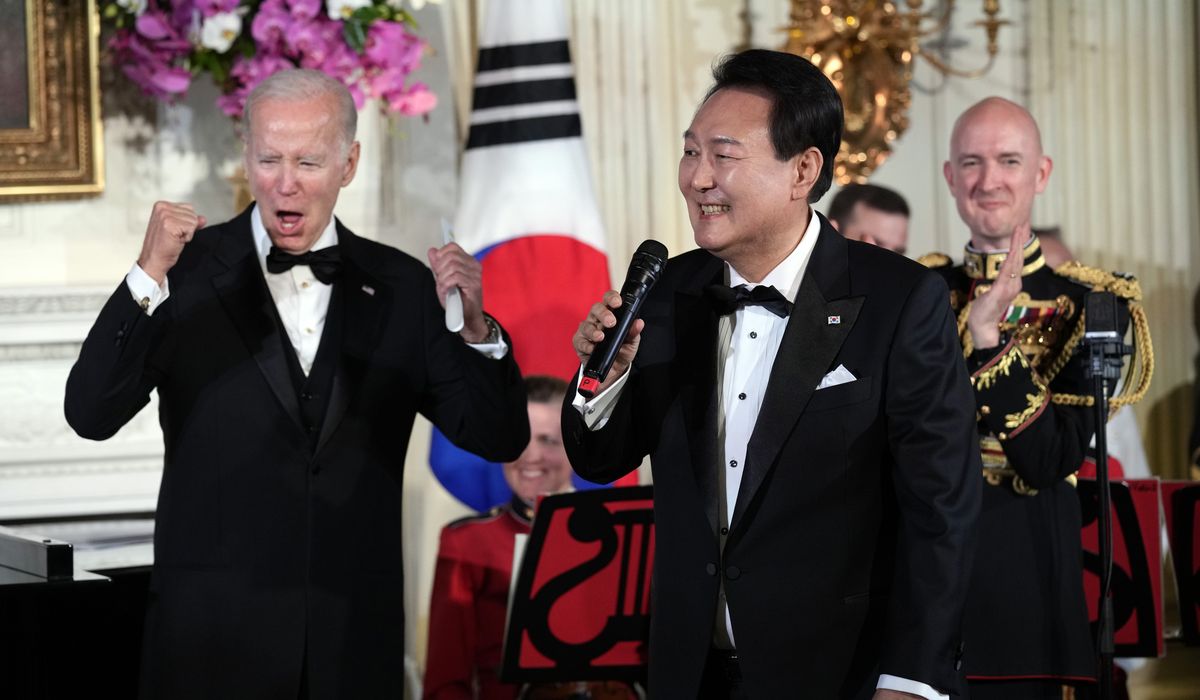


World leaders are being banished to the less-than-dignified White House driveway to engage reporters because President Biden has abandoned the decades-old tradition of holding joint press conferences when heads of foreign governments visit, which critics say undermines U.S. relations around the globe.
So far this year, ten heads of foreign governments have visited Mr. Biden at the White House, but only South Korean President Yoon Suk Yeol got the honor of having a joint press conference for all the world to see.
Without a formal press conference, those leaders were denied appearing with Mr. Biden in the White House’s ornate East Room or picturesque Rose Garden, where U.S. presidents typically host visiting heads of state to field reporters’ questions. Instead, the leaders were given a few minutes for a video clip of them giving a brief statement with Mr. Biden in the Oval Office before reporters were ushered out of the room.
That left some heads of state — eager to engage the world press — standing by themselves on the White House driveway answering questions.
Critics say the brush-off is a bad look for the leader of the free world and hurts U.S. diplomatic relations.
“The joint press conferences are the feathers in the cap that foreign leaders want to take back home with them because it’s their chance to shine on the international stage,” said Steven Groves, former deputy press secretary under President Trump. “I fail to see how they could not see it as slight if they don’t get their moment in the sun with the President of the United States.”
Joint press conferences at the White House with a U.S. president create several benefits for world leaders including increased global exposure and typically a boost in the polls in their home country. It also creates goodwill between the president and the head of state.
Several of the heads of state who have visited the White House this year are key allies in the war in Ukraine or combatting Chinese aggression in the Indo-Pacific region.
“The Biden administration is missing an opportunity to have done a favor for a foreign ally or treat them in a manner that could be invaluable when you need them on a foreign policy issue,” said Matthew Eshbaugh-Soha, a political science professor at the University of North Texas, who has written about the politics of press conferences.
White House press secretary Karine Jean-Pierre demurred when pressed by The Washington Times on the lack of joint press conferences.
“Look, every conversation is different. It is a diplomatic conversation that occurs when we talk about what they’re going to be doing here at the White House. I just don’t have anything more to share on that,” she said.
Spanish Prime Minister Pedro Sanchez will meet Mr. Biden at the White House on Friday, but a press conference is not publicly scheduled. When asked if the two leaders would take questions together, Ms. Jean-Pierre said she didn’t have anything to share.
Some of the snubs have been somewhat baffling.
German Chancellor Olaf Scholz visited the White House in March against the backdrop of the Ukraine war and amid tensions between Berlin and Washington over a tank deal. Yet, Mr. Biden abandoned the tradition of his predecessors and did not offer a G-7 ally a joint press conference.
When Mr. Biden hosted Japanese Prime Minister Fumio Kishida in January, another G-7 ally, he again skipped the joint press conference even though there was time to schedule it. Mr. Biden left the White House around 3:30 p.m. that afternoon to go to his Delaware home for the weekend.
Irish leader Leo Varadkar, who visited the White House in March, was also denied a joint press conference. He talked to reporters for nearly half on the White House driveway.
Colombian President Gustavo Petro also stood on the White House drive to talk with reporters.
There was no joint press conference when Brazilian President Luiz Inacio Lula da Silva visited in February after an insurrection nearly toppled his government. Eager to tell his side of the story, Mr. Lula stood alone in the White House driveway on a dark, cold night to answer reporters’ questions.
“That was the president of Brazil, the largest country in South America, and he was standing outside in the dead of night talking to reporters. Compare that to the prestige of standing next to the President of the United States in the East Room,” Mr. Groves said.
Mr. Biden has given less than half as many joint press conferences as his predecessors — hosting just 13 through by the end of April, according to data compiled by Martha J. Kumar, director of the White House Transition Project. Mr. Trump held 37 joint press conferences, while President Obama held 29, and President George W. Bush held 38 during the same period.
Mr. Biden also lags in overall press conferences with just 24 compared to Mr. Trump’s 43, Mr. Obama’s 52 and Mr. Bush’s 46 at the same point in their presidencies.
The White House has reduced opportunities for journalists to ask Mr. Biden questions to protect him from unscripted exchanges that have resulted in mental miscues, misstatements or gaffes.
Those risks could be magnified on the international stage if Mr. Biden misstates U.S. policy during a press conference beside another world leader. For example, on three occasions the White House has had to walk back Mr. Biden’s repeated suggestions that the U.S. would deploy troops to defend Taiwan from China, which contradicts the longstanding One China policy.
Mr. Biden was photographed last month holding a cheat sheet during his press conference with Mr. Yoon of South Korea, which became a story that somewhat overshadowed what the two leaders talked about.
“White House staffs are risk-averse because no one wants to recommend something that turns out less than useful for a president,” said Ms. Kumar.
• Jeff Mordock can be reached at jmordock@washingtontimes.com.
